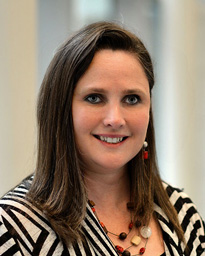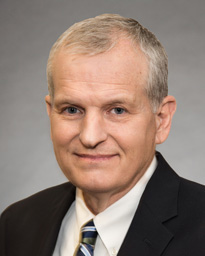The following studies are ongoing through the support of TIRR Memorial Hermann Rehabilitation Innovation Awards. Each year, a Pilot Award of up to $50,000 is granted to an experienced investigator to fund an innovative pilot project that will lead, ultimately, to federal or foundation funding for expanded research studies. Two staff awards, ranging from $5,000 to $10,000, support smaller projects designed to give therapists, nurses, social workers and other staff hands-on experience in research with mentoring by experienced investigators.
Home Neuromodulation of the Neurogenic Bladder in Chronic Spinal Cord Injury with Transcutaneous Tibial Nerve Stimulation

“Nearly everyone with spinal cord injury has some degree of bladder impairment, which researchers have identified as the number-one priority for improvement in quality of life with SCI,” says Dr. Stampas, an attending physician in the Spinal Cord Injury Program at TIRR Memorial Hermann and a Clinical Assistant Professor in the Department of Physical Medicine and Rehabilitation at McGovern Medical School at UTHealth. “The gold standard for treatment of neurogenic bladder involves the use of anticholinergic bladder medications, which have harmful side effects that ultimately lead to non-compliance. Evidence suggests that electric stimulation can produce the same results without the harmful side effects, but current practice is restricted to the clinic setting.”
In the clinic, percutaneous TNS is performed by trained health care technicians under physician supervision. They insert a needle into the skin to direct the electric current, a process that requires frequent clinic visits in a population with known accessibility challenges. Transcutaneous tibial nerve stimulation accomplishes the same result using noninvasive surface electrodes. To date, the modality has been used only in the clinic setting.
Dr. Stampas’ research represents a substantive departure from the status quo by suggesting the use of TTNS at home to replace anticholinergic medications. “There’s a gap in our knowledge about the safety and feasibility of using TTNS at home for bladder neuromodulation in patients with SCI,” he says. “Our current study is based on the hypothesis that TTNS can be performed at home by those with SCI or their caregivers, and will lead to decreased use of bladder medication. It will also provide a dignified treatment for neurogenic bladder that can improve quality of life.”
A safe, affordable, lifelong TTNS program that can be used by people with SCI at home would significantly alter life for the more than 1 million people living with spinal cord injury and its associated functional impairments. In a previous study the researchers applied the TTNS protocol to 19 acutely injured SCI patients during inpatient rehabilitation. They reported 100% compliance and tolerability, no changes in pain scores during and after treatment, and no adverse events such as urinary tract infections or skin irritation.
“Data suggests that the control group followed the expected course of neurogenic bladder over time, with more bladder spasms, higher pressures and lower bladder capacity,” Dr. Stampas says. “The stimulation group has not followed this path. Based on this pilot data, we believe the TTNS protocol can be replicated at home by people with SCI or their caregivers and improve continence.”
Using the innovation award, Dr. Stampas will recruit 14 people with chronic SCI who perform intermittent indwelling catheterization and experience leakage between caths. After the first week of the study, they will be asked to discontinue their medication and rely solely on TTNS to remain continent for three weeks.
“We expect our work to generate preliminary data that will fundamentally increase our knowledge of TTNS in chronic neurogenic bladder and guide future studies on lifelong management of neurogenic bladder with TTNS,” Dr. Stampas says. “In a population known to have low financial resources and barriers to accessing medical care, we see this as an opportunity to develop a cost-saving intervention that will be sustainable at home.”
For more information on the study, contact Dr. Stampas at (713) 797-5938.
Assessing a Dual-task Gait-training Intervention in Persons with Multiple Sclerosis
Gregory Brusola, PT, DPT, MSCS, is the recipient of a 2018 TIRR Memorial Hermann Rehabilitation Innovation Award that he hopes will eventually improve the ability of people with multiple sclerosis to perform two simultaneous tasks effectively. He will use the $10,000 grant to contribute to current medical knowledge of the effectiveness of gait-specific dual-task training interventions, laying the groundwork for larger-scale studies that will help guide clinicians in the future.
“Although gait impairment has been attributed to MS symptoms such as muscle weakness, pain, spasticity, fatigue, and sensory and visual disturbances, research in the last decade has linked cognitive dysfunction to motor impairments in balance and gait,” says Brusola, principal investigator of the study and a physical therapist at TIRR Memorial Hermann Outpatient Rehabilitation-Kirby Glen. “In physical therapy we’ve had a tendency to gloss over cognitive function without integrating it firmly into the plan of care. Recently more research is focused on cognitive motor interference and on the individual’s ability to perform two simultaneous tasks, such as walking and talking. For people with MS, the act of walking requires enormous use of cognitive function. When another task is added – remembering the grocery list or talking to others, for example – we begin to see large detriments in walking that lead to increased risk of falling.”
Current evidence examining gait-specific dual-task training interventions in people with MS is lacking. The researchers’ goal is to determine how much gait-specific dual-task training improves study participants’ walking ability, and whether it improves their ability to walk while performing a secondary task. They will compare the effects of a dual-task and single-task intervention on spatiotemporal gait and dual-task gait parameters, between disability and cognitive levels, on performance measures and on fatigue.
Twelve adults with MS, ages 18-65, will be recruited from clinics and support groups. Participants must be able to walk independently with or without an assistive device, live independently in the community, have no history or presence of other clinically significant disease, have been relapse free for the past 30 days, and not be engaged in other rehabilitation therapy during the study.
Co-investigators are Marissa Lyon, PT, DPT, and Daniel Wingard, PT, DPT, physical therapists at TIRR Memorial Hermann Outpatient Rehabilitation-Kirby Glen. The study will continue into mid-2019. For more information, contact Brusola at gregory.brusola@memorialhermann.org.
Dr. Angelle Sander Named to Deliver the Mitch Rosenthal Memorial Lecture

An associate professor with tenure in the Department of Physical Medicine and Rehabilitation and director of the division of Clinical Neuropsychology and Rehabilitation Psychology at Baylor College of Medicine, Dr. Sander is co-project director for the Texas Traumatic Brain Injury Model System of TIRR for which she leads a multisite collaborative project on health literacy and its impact on health outcomes following TBI. She is also site PI for a project on developing a quality of life measure for caregivers of persons with TBI and on a study examining the relationship between negative attributions and anger and aggression following TBI.
Dr. Sander’s history of federal grant funding began in 1997. Her areas of expertise include caregiver assessment and interventions, cognitive and psychosocial interventions, community integration of persons with TBI, intimacy and sexuality after TBI, assessing and treating substance abuse in persons with TBI, and ethnic diversity in outcomes. She has more than 80 peer-reviewed publications and numerous book chapters and published abstracts.
The annual Williamsburg Conference was originally established by Virginia Commonwealth University at the Medical College of Virginia. For more than a quarter of a century, service providers and clinical researchers have gathered together every spring to explore problems facing people with traumatic brain injury and their families. In 2008, the Mitchell Rosenthal Memorial Lecture first debuted to honor the contribution of the late Dr. Rosenthal to the traumatic brain injury rehabilitation field. Each year, the memorial lecture presenter is chosen based on professional accomplishments and personal qualities.
“Mitch Rosenthal was a collaborator and close friend of my mentor when I was a postdoctoral fellow at Virginia Commonwealth University/Medical College of Virginia, and because of that relationship I had the opportunity to work on publications with him,” Dr. Sander says. “He was the facilitator of the first national workshop that I presented on the impact of TBI on family and caregivers. Dr. Rosenthal was patient and encouraging – a wonderful mentorship experience for me. I am honored to deliver this lecture in his memory so many years later.”
BRAVE: Bridging Recovery Allies in Virtual Environments After Traumatic Brain Injury

Touchett will recruit 18 individuals with TBI and nine caregivers, for a total of 27 study participants, from the TIRR Memorial Hermann Outpatient Medical Clinic and TIRR Memorial Hermann Outpatient Rehabilitation-Kirby Glen. Participants will be assigned to three support groups with six people per group. The groups will meet in a private, easy-to use virtual environment for two one-hour sessions each week for six weeks.
“TBI generally brings catastrophic life changes. Anything we can do to reduce barriers to socializing will help with recovery,” says Touchett, principal investigator of the study and supplemental education resource specialist at TIRR Memorial Hermann. “In addition to the social support component, we’ll provide social communication training. Communication impairment is common in persons with TBI. As health care providers we need to find new ways to help survivors reintegrate into the community.”
For more information about the study, contact Touchett at hilary.touchett@memorialhermann.org.
Dr. Mark Sherer Receives the Robert L. Moody Prize

Administered by a board of governors and considered by a panel of experts, the Moody Prize honors individuals or a team of individuals who have made significant contributions in applied brain injury research and rehabilitation. In selecting each year’s recipient, the panel considers the total impact of a candidate’s work, his or her individual achievements and unique contributions and recognitions by peers within the scientific or rehabilitation communities. The $10,000 honorarium that accompanies the prize provides incentives for future initiatives in clinical research, rehabilitation and support.
Dr. Sherer is a board-certified neuropsychologist with more than 30 years of experience as a clinician, administrator and educator in brain injury rehabilitation. He is a fellow of the American Psychological Association, the National Academy of Neuropsychology and the American Congress of Rehabilitation Medicine. He has served as principal investigator for grants on TBI recovery, impaired self-awareness, telephone counseling for persons with TBI, TBI community integration and rehabilitation of brain tumor patients, and has published more than 150 articles and book chapters and made numerous presentations at state, national and international conferences. He is the recipient of Mitchell Rosenthal Award for Traumatic Brain Injury Model Systems National Database Research, awarded by the TBI Model Systems Program; the Leonard Diller Award for Scholarly Contributions to Neurorehabilitation, awarded by the American Psychological Association Division of Rehabilitation Psychology; the Williams Fields Caveness Award for National and International Contributions to Bettering the Lives of People Who Have Sustained Brain Injury, awarded by the Brain Injury Association of America; and the Harold E. Yuker Award for Research Excellence, awarded by the journal Rehabilitation Psychology and the Rehabilitation Psychology Division of the American Psychological Association.
“I’m especially honored to receive the Moody Prize because it represents decades of my work and the work of others with whom I’ve collaborated since I started in the field of brain injury rehabilitation in 1984,” Dr. Sherer says. “I’m grateful to have worked with patients with TBI and their families, and witnessed their determination to improve their lives and their willingness to participate in research. They’ve volunteered their time to help us advance knowledge and treatment. Some have gained personal benefit, and all have helped future patients with TBI. These patients, their families and my research collaborators are an awesome group of people.”
TIRR Memorial Hermann Recognized by MQii for Malnutrition Improvement Initiative
TIRR Memorial Hermann has been recognized by the Malnutrition Quality Improvement Initiative (MQii) Learning Collaborative as a pioneer post-acute care participant in 2017. The initiative was led by Rya Clark, RD, LD, CNSC, who was interviewed in the January 2018 issue of MQii’s newsletter, The Dish. “We were the first inpatient rehabilitation facility to enter MQii’s Learning Collaborative 2.0 last year with the goal of advancing malnutrition care in the post-acute care setting,” says Clark, who is clinical nutrition manager for the TIRR Memorial Hermann. “The impact of malnutrition in acute care is well-defined in the literature, although it is under recognized in the rehabilitation setting. The MQii continuously benchmarks participants against malnutrition care best practice while supporting quality-improvement efforts to that end.”
Best practices span the clinical workflow, including nutrition screening; assessment; diagnosis; care plan development; intervention implementation; and monitoring, evaluation and discharge planning. Electronic clinical quality measures are used to evaluate whether the facility achieves malnutrition standards of care. Acute care hospitals that have implemented these best practices have shown improvements in outcomes.
Clark and her team identified continuous nutrition risk monitoring as a foundation quality improvement project because the rehabilitation hospital’s average length of stay – 30 days – is much longer than that of acute care hospitals. “We are capturing patients initially admitted with malnutrition, but patients who were admitted with no nutritional concerns may develop them during their stay with us,” she says. “We needed to draw the registered dietitian back into the plan of care when necessary. We partnered with our nursing directors and teams to implement malnutrition risk referrals from nurses and therapists during the first quarter of our collaboration with MQii.” In 2018, TIRR Memorial Hermann’s dietitians and physician fellows are partnering to focus on nutrition care planning for the hospital’s most at-risk patients. When strategies have demonstrated measurable improvement toward best practice at TIRR Memorial Hermann, the team will begin implementation across the TIRR Memorial Hermann Rehabilitation Network, which includes seven inpatient rehabilitation units and seven outpatient centers.
The Malnutrition Quality Improvement Initiative (MQii) is a project of the Academy of Nutrition and Dietetics, Avalere Health and other stakeholders who provided guidance through a collaborative partnership.
Congratulations to the Memorial Hermann Medication Safety Officers’ Interlock Team, of which Sarah Lake Wallace, MS, PharmD pharmacy manager at TIRR Memorial Hermann, is a member. The team was awarded the Texas Society of Health-System Pharmacists Collaborative Practice Recognition Award for 2018 at the annual meeting in April in The Woodlands, Texas.
The Model Systems Knowledge Translation Center featured the perspectives of health care professionals at the Texas TBI Model System of TIRR Memorial Hermann last fall as part of its Hot Topics Series: Changes in Memory after TBI. The clinicians provided clinical insight on the changes in memory some people experience after sustaining a TBI. Visit the Model Systems Knowledge Translation Center's website.